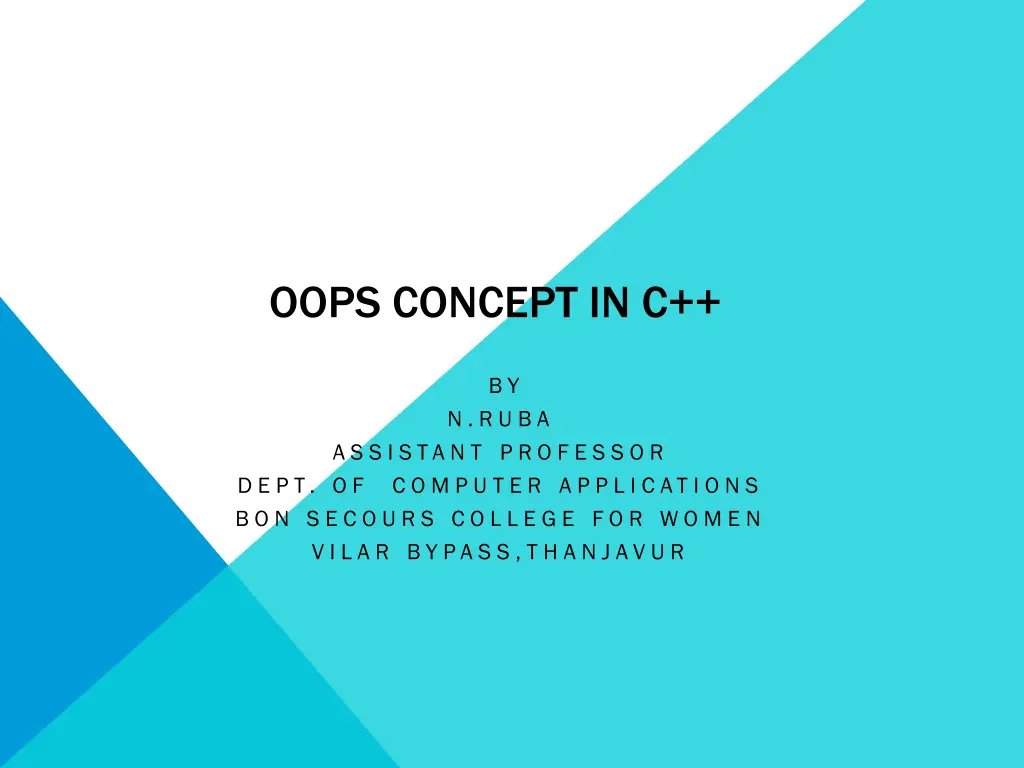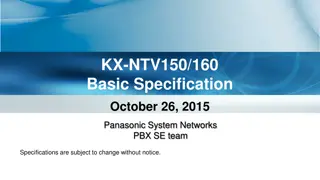
Object-Oriented Programming Concepts and Features in C++ for Beginners
Explore the fundamental concepts of Object-Oriented Programming (OOP) in C++, including Abstraction, Encapsulation, Inheritance, Polymorphism, Overloading, and Exception Handling. Understand the significance of objects, classes, and the principles that drive OOP to manage complexity and enhance code reusability.
Download Presentation

Please find below an Image/Link to download the presentation.
The content on the website is provided AS IS for your information and personal use only. It may not be sold, licensed, or shared on other websites without obtaining consent from the author. If you encounter any issues during the download, it is possible that the publisher has removed the file from their server.
You are allowed to download the files provided on this website for personal or commercial use, subject to the condition that they are used lawfully. All files are the property of their respective owners.
The content on the website is provided AS IS for your information and personal use only. It may not be sold, licensed, or shared on other websites without obtaining consent from the author.
E N D
Presentation Transcript
OOPS CONCEPT IN C++ B Y N . R U B A A S S I S TA N T P R O F E S S O R D E P T. O F C O M P U T E R A P P L I C AT I O N S B O N S E C O U R S C O L L E G E F O R W O M E N V I L A R B Y P A S S , T H A N J A V U R
FEATURES OF OBJECT ORIENTED PROGRAMMING Objects Objects Classes Classes Abstraction Abstraction Encapsulation Encapsulation Inheritance Inheritance Polymorphism Polymorphism Overloading Overloading Exception Handling Exception Handling
ABSTRACTION Definition Definition: : includes perspective of the viewer of the system. An Abstraction is a model of a complex system that includes only the essential details. Abstractions are the fundamental way that we manage complexity. Helps to manage complexity of a large system. Support our quality goals of modifiability and reusability. A model complex of a system that only the details essential to
OBJECTS Objects are basic unit of OOP. They are instance of a class. Consists of various data members and member functions. These data types and member functions are bundled together as a unit is called objects.
CLASSES It is similar to Structure in C. Class is user defined data type. It holds own data members and member functions. Class can be accessed and used only by instance of that class. It is basically blueprint for object.
ENCAPSULATION It can be said Data binding. It binds VARIABLES and FUNCTIONS together inside a class. Object Oriented Programming provides you to place, data and relevant functions together in the same object. Data binding.
INHERITANCE Code reusability. Process of forming new class from an existing class. Inherited class is called Base class. Class which inherits is called Derived class. Pros : Pros : Helps to reduce code size.
TYPES OF INHERITANCE IN C++ Single Single inheritance. inheritance. Multiple inheritance. Multiple inheritance. Hierarchical inheritance. Hierarchical inheritance. Multilevel inheritance. Multilevel inheritance. Hybrid inheritance. Hybrid inheritance.
POLYMORPHISM It makes the code more readable. Function with same name but different arguments. Functioning is different. Poly refers to many. Types of Polymorphism Compile time Polymorphism. Run time polymorphism.
OVERLOADING It is a part of polymorphism. Existing function or operator It is a part of polymorphism. Existing function or operator is made to operate on new data type. is made to operate on new data type.
EXCEPTION HANDLING It It part of Object Oriented Programming Concept. part of Object Oriented Programming Concept. Used to handle unresolved exception or errors during Used to handle unresolved exception or errors during runtime. runtime.

